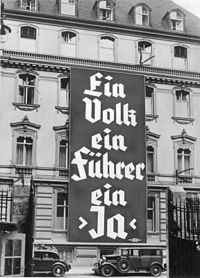| |||||||||||||||||||||||||||||||
All 661 seats in the Reichstag 331 seats needed for a majority | |||||||||||||||||||||||||||||||
|---|---|---|---|---|---|---|---|---|---|---|---|---|---|---|---|---|---|---|---|---|---|---|---|---|---|---|---|---|---|---|---|
| Registered | 45,178,701 ( | ||||||||||||||||||||||||||||||
| Turnout | 95.3% ( | ||||||||||||||||||||||||||||||
| |||||||||||||||||||||||||||||||
| |||||||||||||||||||||||||||||||
Parliamentary elections were held in Germany on 12 November 1933. They were the first since the Nazi Party seized complete power with the enactment of the Enabling Act in March. All opposition parties had been banned by the Law Against the Formation of Parties (14 July 1933), and voters were presented with a single list containing Nazis and 22 non-party "guests" (Gäste) of the Nazi Party. These "guests", who included the likes of Alfred Hugenberg, still fully supported the regime of Adolf Hitler in any event.[1]
This election set the tone for all further elections and referendums held in the Nazi era. Official results showed 92 percent of the voters approved the Nazi list, on a turnout of 96 percent. The vote was held in far-from secret circumstances; many voters feared that anyone who voted "no" would be detected and punished for doing so. In some communities, voters were threatened with reprisals if they dared to vote no, or even if they simply failed to vote at all.[2] Nonetheless, 3.3 million voters submitted invalid ballots.
By November 1933 the Nazi government had already established a concentration camp system, although camp inmates retained the right to vote. In several camps the Nazi list was endorsed by a large majority of voters and The Guardian reported that that meant an amnesty was considered likely.[3]
The elections were held on the same day as a separate referendum on Hitler's decision to pull Germany out of the League of Nations, which passed with similar numbers. The new Reichstag, exclusively composed of NSDAP members and sympathisers, convened on 12 December to elect a Presidium headed by President of the Reichstag Hermann Göring.
- ^ Read, Anthony (2004). The Devil's Disciples: The Lives and Times of Hitler's Inner Circle. London: Pimlico. p. 344. ISBN 0-7126-6416-5.
- ^ William Shirer, The Rise and Fall of the Third Reich (Touchstone Edition) (New York: Simon & Schuster, 1990)
- ^ "All Germans rounded up to vote". The Guardian. 13 November 1933.

